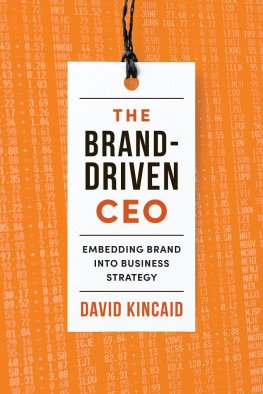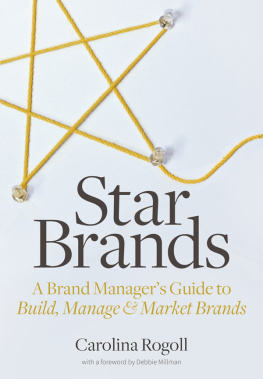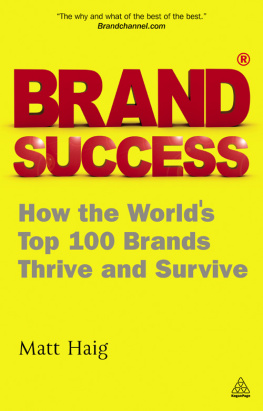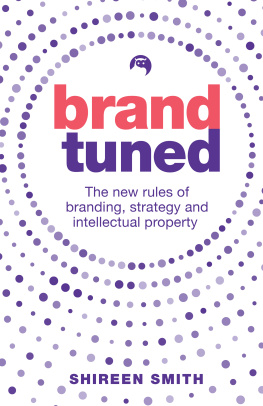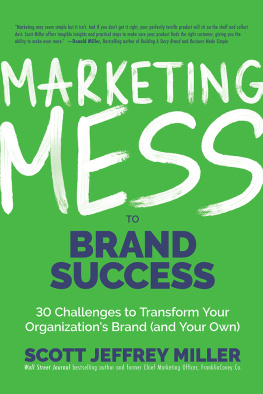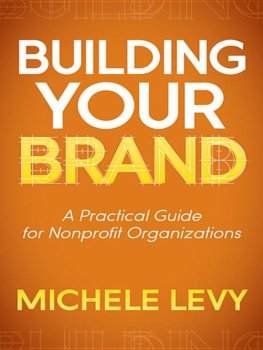
ADVANCE PRAISE FOR THE BRAND-DRIVEN CEO
The Brand-Driven CEO is a must read. David Kincaid impressively demonstrates why he is a global brand expert, guiding leaders into the next chapter of how to treat and protect their brands.
Jan Heck, President and CEO, Miele Inc.
I have seen the benefit of David Kincaids approach to brand-asset management in two different service industries. Embedding brand-asset management into a companys strategy builds a culture of collaboration, ownership, and accountability. Davids book provides CEOs with a step-by-step process that requires leadership at the top levels and allows for continuous improvement as customers needs change. It is a great journey that value-driven CEOs should embrace to build their companies resilience and sustainability for the future.
Marilynne Day-Linton, Board of Directors, Medical Facilities Corporation
As leaders, we all need to ask ourselves those questions that focus on the deepest elements of strategy. In The Brand-Driven CEO, Kincaid not only modernizes the 4Ps of marketing but he also provides a framework that leaders can use to ensure their organization competes to win by living the values of their brand and understanding their important role in managing brand as a business system.
Bryan Pearson, former President and CEO, LoyaltyOne
The brand is one of the most critical elements of a successful company. With Davids book, you will learn how to identify it, evaluate it, and manage it systematically.
Yajun (Carol) Jiang, President, Beneco Packaging
David Kincaids book provides CEOs with a roadmap to place the corporate brand at the centre of all core strategic decisions.
Paul Seed, CEO and Owner, StarTech.com

Rotman-UTP Publishing
An imprint of University of Toronto Press
Toronto Buffalo London
utorontopress.com
K Inc. 2020
Library and Archives Canada Cataloguing in Publication
Title: The brand-driven CEO: Embedding brand into business strategy / David Kincaid.
Names: Kincaid, David, 1959 author.
Description: Includes bibliographical references and index.
Identifiers: Canadiana (print) 20200307274 | Canadiana (ebook) 20200307320 | ISBN 9781442649859 (hardcover) | ISBN 9781442621657 (EPUB) | ISBN 9781442621640 (PDF)
Subjects: LCSH: Product management. | LCSH: Branding (Marketing) | LCSH: Success in business.
Classification: LCC HF5415.15.K56 2020 | DDC 658.8/27dc23
All rights reserved. No part of this publication may be reproduced, stored in or introduced into a retrieval system, or transmitted in any form or by any means (electronic, mechanical, photocopying, recording, or otherwise) without the prior written permission of both the copyright owner and the above publisher of this book.
ISBN 978-1-4426-4985-9 (cloth) ISBN 978-1-4426-2165-7 (EPUB)
ISBN 978-1-4426-2164-0 (PDF)
Printed in Canada
We acknowledge the financial support of the Government of Canada, the Canada Council for the Arts, and the Ontario Arts Council, an agency of the Government of Ontario, for our publishing activities.

Contents
As this book goes to press, the world is struggling in the midst of the most devastating pandemic in modern history. COVID-19 has taken hundreds of thousands of lives and afflicted millions more. It has paralyzed governments, crippled businesses, and stranded individuals in a purgatory of unemployment, isolation, and insecurity.
This crisis will change the global marketplace in ways that we can only imagine and as it does so, the marketplace will look to trusted brands for reassurance. More than ever, I believe that the principles and practices that I discuss in this book will remain or become even more critical to the emergence, survival, recovery, and prosperity of trusted, brand-based organizations throughout the world that serve their markets with a clear purpose.
THE BRAND-DRIVEN CEO
Todays best practices lead to dead ends. The best paths are new and untried.
Peter Thiel
Markets have never been more competitive, more segmented, or faster moving than they are today. Margins are shrinking. Customer loyalty is declining. Digital is disrupting entire industries. Brands are proliferating. In short, its harder than ever to compete and win.
Yet amid all this chaos and confusion, a select few companies consistently outperform their peers, year after year. Some have been doing this for decades. Firms like McDonalds, LEGO, Campbell Soup Company, Under Armour, and Disney routinely create more value for their shareholders and customers than their competitors, and theyre rewarded with a dominant share of their markets, along with steadily rising share prices. (Until recently, I would have included Boeing among these examples, but as Ill discuss later, Boeings CEO and leaders took their eye off the brand and quickly suffered the consequences.)
How do they do it? Whats their secret?
While many have tried to copy these companies best practices, few have come anywhere close to their success. Is it because theyre uncopyable, or are we simply so blinded by the noise and confusion thrown up by todays unruly marketplace that we miss the obvious? For the answer, lets look at four commonly accepted truths about great companies:
Truth 1: Great companies offer better products and services.
FALSE product innovation generally comes from start-ups and smaller players.
Truth 2: Great companies offer the lowest price.
FALSE their products usually sell at a premium.
Truth 3: Great companies have a superior distribution system.
FALSE sometimes they do (e.g., Amazon), but mostly not. Theres no consistent correlation.
Truth 4: Great companies produce more memorable marketing.
FALSE great companies seldom produce more breakthrough advertising than their peers. Even when they do, marketing alone doesnt drive sustainable growth.
These four apparent truths are known collectively as the 4Ps: Product, Price, Place, and Promotion. Theyre the bedrock on which marketing has been taught in business schools for the past fifty years. The 4Ps, also called the marketing mix, are defined as the set of actions or tactics that a company uses to promote its brand or product in the market.
But if you look at great companies like the ones Ive just mentioned, youll see that none of the 4Ps actually applies to them.
So, what drives these companies to sustained greatness?
Lets look at one other commonly accepted truth about great companies:
Truth 5: Great companies are better led and managed than their peers.
Unlike the first four attributes, this one is TRUE.
Great companies are indeed better managed than their peers. But this fact alone doesnt give us much insight. For that, we have tolook at how they are better managed. What are the best-management attributes that all great companies share?
Based on my experience and research, all great companies have three things in common:
Leaders at great companies think differently than their peers. They see things that leaders in other companies dont.
They think more strategically about their assets.
They create cultures that are both opportunistic and nurturing.
Next page
